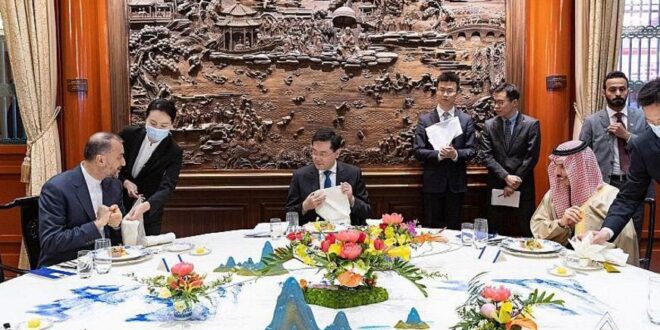Saudi and Iranian foreign ministers met in Beijing on Thursday as China’s role expands in the Middle East.
Iran’s Foreign Minister Hossein Amir-Abdollahian described a meeting with his Saudi counterpart Prince Faisal bin Farhan in Beijing on Thursday as constructive, in their bid to find a path toward reconciliation following more than seven years of hostilities.
Amir-Abdollahian wrote on Twitter Thursday that the pair “stressed stability, sustainable security and development in the region.” The meeting is the first extensive gathering on the foreign ministerial level between Riyadh and Tehran since 2014, and the first to brokered by China building on its strong ties with both parties.
The talks in Beijing covered a range of topics, including the official resetting of Saudi-Iranian diplomatic relations, reopening of embassies and resumption of Hajj pilgrimage for Iranians, as well as economic and trade ties, according to the Iranian minister.
Iran’s state broadcaster showed the Chinese foreign minister standing between the two sides, having them shake hands less than a month after top security officials from Tehran and Riyadh agreed in the same city to resume relations.
Riyadh shut down its embassy in Tehran in 2016 after it was stormed by hard-liners enraged by the Saudi execution of a pro-Iran Shiite cleric.
The two ministers also issued a joint statement, which according to the version published by the Iranian Foreign Ministry, highlighted the continuation of efforts toward the implementation of the original deal. As for the reopening of the embassies, the statement did not specify a timeframe, but noted that it will happen “at an agreed time,” while experts from the two sides will negotiate visa details and the resumption of direct flights.
🔽بسم الله الرحمن الرحیم
بیانیه مشترک گفتوگوهای میان و و زیر امور خارجه جمهوری اسلامی ایران وزیر امور خارجه عربستان سعودی در شهر پکن pic.twitter.com/FN7H3FLJ8p
— 🇮🇷 وزارت امور خارجه (@IRIMFA) April 6, 2023Iranian media from across the spectrum hailed the meeting. The hard-liners, who once wrote relentlessly scathing criticism and pejorative rhetoric against Saudi Arabia, have dramatically shifted the anti-Saudi tone in the past few weeks. Hailing the meeting and the rapprochement, the state-run Mehr News Agency spoke of benefits for “both sides and for the region’s security and stability.”
Even the Reformist news outlets, known for their sharp criticism of the sitting hard-line administration led by ultraconservative Ebrahim Raisi, welcomed the meeting.
The pro-Reform Shargh daily led its front page on Thursday with a story on “peace in Beijing,” referring to the talks as a key step toward “boosting regional security.”
“The Chinese guarantee,” read a similar headline from Arman-e Melli, which found China an influential player far beyond that of an ordinary mediator.
 Eurasia Press & News
Eurasia Press & News




